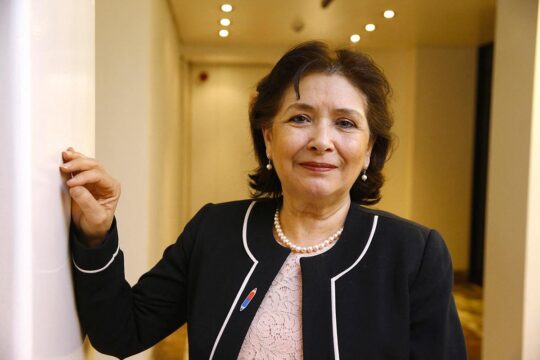Tunisia’s government adopted the draft law on “Reconciliation in the Economic and Financial Sectors” on July 14, 2015, and forwarded it to parliament. A public uproar halted parliamentary debate on the bill at that time, but on June 29, 2016, the general committee on legislation started debating it. The president of the parliament has asked the members to adopt the law in a plenary session before their summer recess starts on July 25.
In Tunisia, as elsewhere, there is an association between corruption and human rights abuses. According to the 2012 report of the National Commission to Investigate Corruption and Embezzlement, Ben Ali’s family and friends diverted public funds and lands for their benefit, instrumentalizing state institutions such as public banks, the judiciary, and the police to benefit themselves and to punish those who resisted their business initiatives.
The bill, if adopted, would terminate ongoing – and preempt future – prosecutions and trials of public servants and other state officials for financial corruption or misuse of public funds, for anyone who did not carry out the act for personal gain. The law would void sentences or halt prosecutions for business people or government officials who benefited personally from financial corruption or embezzlement. Instead, they would be allowed to negotiate a “reconciliation” agreement with a state-run commission to repay unlawfully obtained money to the state treasury.
President Beji Caid Essebsi first proposed the bill during his Independence Day speech on March 20, 2015. He said it would “improve the environment for investment” and increase the recovery of assets from corrupt business executives, allowing the assets to be used for development projects.
But these measures could undermine the transitional justice process, initiated in 2013 with the enactment of the Organic Law on the establishment and organization of the transitional justice system, Human Rights Watch said. The law sets out a comprehensive approach to addressing past human rights abuses. The law created a Truth and Dignity Commission (TDC), mandated to uncover the truth about human rights abuses committed between 1955 and 2013.
The law allows the commission to mediate cases relating to corruption and economic crimes at the request of an accused person, someone harmed by corruption, or the government. When it accepts a case, the commission can intervene with the judiciary to suspend criminal proceedings related to the case and conduct an investigation.
The commission then drafts an arbitration agreement between the person responsible for the corruption and the government and/or the individual victims. The agreement will include a written acknowledgment and apology from the person responsible and specify the reparations payments the person will make to the government and/or victims. The statements by the perpetrator and evidence collected by the commission are to be made public, to help the commission identify the institutions and networks of individuals that allowed corruption to flourish.
The final agreement ends all prosecutorial proceedings in the case, but they can resume if it emerges that the person responsible for the corruption deliberately concealed the truth or the full extent of the illegal gains.
Just as impunity gives human rights violators a green light to continue their abuse, letting economic criminals off the hook will lead to more corruption.
The commission declared that through July 1, 2016, it has received 685 requests for reconciliation from the government as a victim of misappropriation of public funds and 1,800 other requests from individuals.
While both the Truth and Dignity Commission and the proposed economic reconciliation commission provide a measure of amnesty for economic crimes in exchange for restitution, there are major differences.
In contrast to the mediation process provided by the transitional justice law, which is premised on truth-telling, the proposed economic reconciliation bill would keep confidential both the information obtained from violators who enter the reconciliation process and the commission’s decisions.
This secrecy would undermine the possibility of learning from the findings, or reforming institutions based on them. In addition, the bill provides that no person or institution will be permitted to use information obtained “in the framework of this law for another purpose or in another setting.” This article would effectively preempt the Truth and Dignity Commission from fulfilling its mandate to map the extent of economic crimes committed under the ousted regime.
Another difference between the two mechanisms is their degree of autonomy. The reconciliation commission would be an administrative body, appointed by the executive branch, and would lack the administrative and financial autonomy granted to the Truth and Dignity Commission. Its members would not be granted functional immunity for their work, leaving them more vulnerable to political pressure or retaliation.
The proposed law, by granting blanket amnesty to public officials, would also hamper the government’s ability to establish a vetting process within the public administration to assess the integrity and suitability of government agents and public officials for their jobs in light of any past involvement in corruption. Vetting is viewed as an essential part of transitional justice and aims to exclude officials complicit in serious abuses so that public institutions regain public trust and protect human rights.
Human Rights Watch research in various countries showed that corruption often causes or exacerbates human rights violations. Resolution 23/9 of the United Nations Human Rights Council recognized “that all forms of corruption can have a serious negative impact on the enjoyment of all human rights.” A study by the Office of the United Nations High Commissioner for Human Rights showed that “corruption undermines a State’s human rights obligation to maximize available resources for the progressive realization of rights recognized in Article 2 of the International Covenant on Economic, Social and Cultural Rights.”
The UN Convention against Corruption, which took effect in 2005, requires states to prevent and criminalize corruption and take measures to recover stolen assets.
“The draft law would dispense with the vast legacy of corruption in an atmosphere of secrecy, which is the last thing a country needs if it is to fight this scourge,” Guellali said.
Press release by Human Rights Watch






